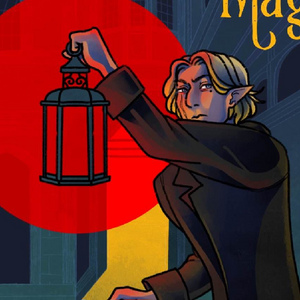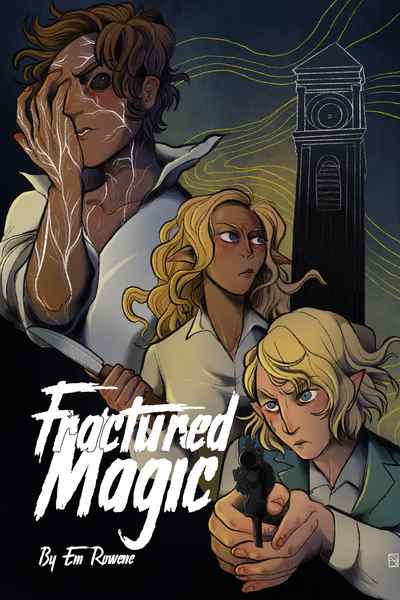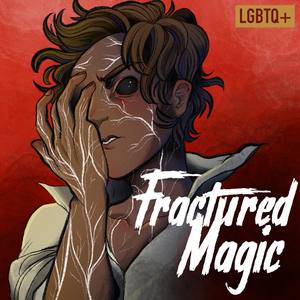"Do you like Egil stories, little one?" asked the young man with the feather-plumed hat.
Isobel laughed and covered her mouth with her hand. “Someone in this family certainly does,” she murmured, quiet enough so that only Gareth could hear — at least, it should have been quiet enough, but the hatted man looked up at the statement, then followed her gaze over to Gareth. He was striking beneath the hat, with tanned skin and large, thick-lashed dark eyes. But when those eyes settled on Gareth, Gareth felt a chill run down his spine. There was a weight in his gaze Gareth hadn’t expected, hadn’t prepared for. He was otherworldly in a way Gareth couldn’t place. Gareth would have been less surprised to see him on the stage; he seemed out of place here among the mundane.
“I take it the lady means you, sir?”
Gareth cleared his throat. “Yes, I…study Egil folklore.”
“He's writing a biography on him,” Isobel explained on Gareth's behalf.
Something in the young man's smile dimmed, but he gestured to the outdoor auditorium on his right, off the main path. “Then I can't promise you haven't heard the story before, but I can guarantee we'll make it worth your while, all the same.” He leaned in as if to share a secret. “The Webhon Players are rising stars in the world of theater. They're performing for Unity itself next week.”
“Which story is it?” Gareth asked.
“The Castle of Eide.”
“Huh,” Gareth said. It was a lesser known Egil story — still common enough, but the version that was most often told these days was based off a novel that had taken significant creative liberties. The original story, the true story...well. Gareth couldn't keep from saying aloud, “How strange.”
The young man hadn't expected that answer. “Strange?” he asked.
“Well, the story is originally based on the old coup in Alfheim, you know. Did you do that on purpose?”
“Do what?” the young man asked, still not following.
“He's here today — Leandros Nochdvor. Left Alfheimr for the first time in over sixty years,” Gareth said.
The young man looked like he'd been struck. For a moment, he simply stared at Gareth with wide, dark eyes, and then he drew an uneven breath. “No, I didn't realize,” he said, his voice too calm for all the emotions flickering across his face. “We've been performing this show all season. It's just a coincidence.”
“O-oh,” Gareth said, not sure what he'd said wrong.
Isobel looked between them, eyebrows raised, then cut the tension. “We may as well stay, Gareth; I’d like to have some time off my feet before we go back.”
The young man flashed a grateful smile, though it was a mere shadow of the one from before. “A smart choice,” he said, ushering them toward the benches. “Enjoy the show!”
Gareth, Isobel, and Ofelia had only just settled in their seats when shadows shifted in the wings and fog crept onto the stage in thick tendrils. Paired with the overcast skies above and stone skene behind, it set a dreary mood. Silence stretched on, and as the crowd began to murmur and shift, the feather-hatted young man jumped onto the stage and bowed to the audience. He seemed slightly off-kilter as he waited for everyone to still: his eyes kept returning to Gareth in the crowd. But finally, when all was quiet, he stepped forward. It was like he cast a spell: when he breathed in, the audience leaned in with him. When he breathed out, they sat back again, dazed. The spell crested when he spoke, his voice solemn, soft in a way it hadn't been before.
“Heroes rise and fall,” he simply said. “In the years following the Great War, we saw the cycle again and again. Hope, then defeat. Determination, then corruption. And before his fall, Egil shone the brightest. But where did that fall begin?”
The young man paused while the crowd cheered; Gareth found himself clapping with the rest, anticipation rising.
“Egil, as you seem to already know,” the man said with a twist of his lips, a little mischief making its way back onto his face, “Became the world’s guiding star after the Great War. He saved lives, ended wars, and made trouble as much as he made a name for himself. But like all heroes, he had doubts. Like heroes inevitably do, he grew tired of bearing the people’s hope. He retired, settled in a golden city that has since passed into memory. The city was ruled by a king who had seen the rise and fall of the Great War, and Egil enjoyed peace there for a time. But when the King fell ill, the people turned on the ruler who made them what they were. Let us take you back in time and tell you how Egil saved a king and lost his peace.”
The young man backed off the stage as he spoke, and from the other wing, two men walked on. The first was dressed in golden fabrics draped over and around him, secured by delicate fastenings. He was elegant and soft, in stark contrast with the man beside him.
“How fares thy father this evening?” the second asked. This one wore an archetypal hero’s ensemble, stage armor with a sword at his side, and had a full beard and graying hair around the temples. He had to be Egil. The other was the King’s “son”, who appeared in many Egil stories, a steady friend. Having seen the real thing in person just that morning, the imitation paled in comparison.
“His state remains unchanged,” answered the Prince, “And the Council grows restless. I fear what will happen should they take matters into their own hands.”
“He will improve before they do. I am certain of it,” Egil said. Then, both hero and prince stopped abruptly as a woman entered from upstage left. “Ho! Who approaches at this late hour?”
Lovely did not do the woman justice. While the hero and the genteel prince had very different looks, both were at least of this world – the world of plots and subterfuge, of heroism and war. This woman was something wholly other, in the same way the young man in the feathered hat was other. The actress was small, dressed in an old gown, and had full dark curls that fell just below her chin. She moved toward Egil as if guided on a breeze, feet barely touching the ground.
Anyone who knew Egil also knew her, the woman who flitted at the periphery of all the world’s stories, heralding strange comings and foretelling calamities. The Oracle of Damael. Her path wound inextricably with Egil’s, the Oracle warning of troubles and Egil preventing them.
“My Lady Oracle,” Egil said stiffly. “What bringest thou to me?”
“My Lord Egil, a warning I must share with thee.”
“Then the sun shines and the wind blows, ev’rything as ever it was. My friend, may I present to thee the Oracle of Damael? Whilst a dear friend she be, I suggest thou leavest ere she speaks her portents. They are never kind to those unfortunate enough to hear.”
Before the Prince could leave, the Oracle stopped him. “I bid thee stay. This concerns thee, young prince. There is one in the castle who would see thy father killed. Stop him before he sees it true.”
They really were quite good, Gareth thought as the show continued. Being well versed in Egil folklore meant that he was picky; he hated when the stories were sensationalized, when they mixed up facts or mis-characterized Egil himself — and because of that, because of the poor novelization, this story was already at a disadvantage. Egil was a fascinating phenomenon, a folk hero across all three species, across all banners and cultures and provinces. Everyone had their own Egil stories, and there was a real man there, beneath the fiction, but the records and accounts were jumbled, contradictory, confused. Only the older races remembered him, and Gareth had met few willing to speak about him after his betrayal in Histrios. It made Egil an interesting puzzle.
While Gareth’s was predominantly an academic fascination, it was also an idolization that went back to his childhood. There was something about Egil: even when you knew the man from the stories didn't exist, you wished he had. Even when the stories ended, when you had to step back and remember that magic isn't real, Egil still taught you the value of hope, the strength to slay your monsters, and that magic is real and it's in the small things. The man from the stories was hope, kindness, compassion incarnate. And that made the truth so much more jarring.
Gareth looked around the crowd, curious to see their reactions. People seemed to be enjoying the show, but one stood out to Gareth: the young narrator again. He stood off to the side, watching Egil with an expression so dark it sent a chill down Gareth's spine. But that gloom fell away in an instant when the Oracle's actress turned in his direction. He smiled, then, and even went a step further: he made a funny face at the stage, the kind Gareth might pull to make Ofelia laugh. The actress quickly averted her eyes, mouth turned down at the corners like she was fighting a smile.
Before Gareth could look away, the young man noticed him watching. He tipped his hat and bowed with a flourish, and Gareth quickly tore his eyes away. When he refocused on the play, trying to ignore the strange chill of the young man’s eyes on him, he found he had missed a portion of it. That was no matter. He'd read the novel, much as he wished he could forget it: the Prince and Egil investigated the assassination plot and discovered the King’s own brother conceived it. Though heartbroken over his uncle’s betrayal, the Prince helped Egil stop him, laying a trap for the traitor.
Egil fought the Uncle with choreography that danced magnificently across the stage. At the fight’s climax, the Uncle stumbled; Egil held his hand out and a shower of sparks shot out from some contraption in the stage floor. Spectators in the front row jumped at the sudden light, then erupted into cheers; beside Gareth, Ofelia squealed in delight. Then, with the Uncle’s defeat, the show was over. Gareth, Isobel, and Ofelia stayed for the curtain call, but by unspoken agreement, they had reached their limits for the day.
“I’m guessing Moira won’t make it for dinner?” Isobel asked as they circled back to the festival entrance.
“Nor for the indefinite future, I’d imagine,” Gareth replied, “Given everything. By the way, I'd meant to tell you: Prince Nochdvor likes your books.”
Isobel blinked, then laughed. “Oh! How’d you find that out?”
“It’s a rather long story.”
“Well, then, let’s get this one home for a nap first. Would you mind carrying her for a while? I’m afraid she’s going to fall asleep on her feet if we continue on this way.”
“Of course, dear,” Gareth said, scooping up Ofelia and following his wife through the crowd.











Comments (5)
See all